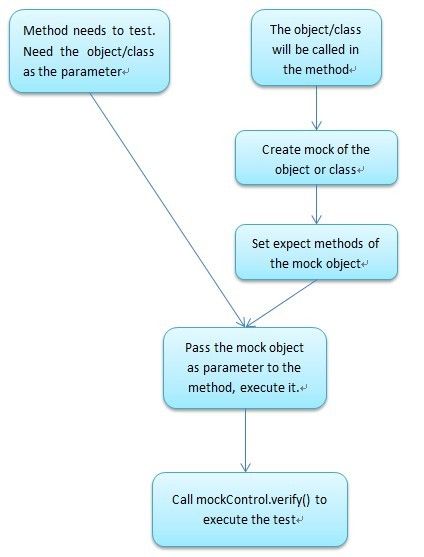用于前端行为测试的JsMock
JsMock用于测试行为,接口的交互测试。
JsMock的地址: http://jsmock.sourceforge.net/
先看个官网上的最简单的例子
大概的流程如图:

JsMock功能简单却很实用。关键是看你如何运用。首先前端开发人员要有意识的做到UI/Logic分层。让UI部分的code仅仅只做UI显示用。任何逻辑相关的代码可以分离出来。目前前端UI测试没有好的工具,只能靠人肉。但是逻辑部分的code我们完全可以做好单元测试。利用JsUnit和JsMock做状态,行为测试。保证我们的代码质量。
JsMock的方法:
再来贴下JsMock的部分源码:
今天我给同事分享了这个,有人问我能否用JsMock模拟Ajax call的数据。我觉得可以定义一个测试用的Ajax类。加上用setInterval/setTimeout来模拟异步call的特性。关键看你自己如何运用。
我个人觉得JsMock非常的实用。
1. 节省时间
2. 保证代码质量
3. 不会被别人block住
这里有人会说要写额外的代码,怎么叫节省时间。可能你在写这些代码的时候是花了时间。但是比起后面要花在跟别人接口整合,和调试问题的时间,这点时间完全是值得的。
保证代码质量这块就不多说了。这是所有测试的目标。你可以写尽可能多的测试case,保证你的代码质量。
Mock即模拟的意思。即使在你开发时候你所依赖的接口还没有好,你可以把对象Mock起来,用andReturn/andThrow等方法来控制返回结果,控制你自己代码的行为。
在以后的代码我会尽量按照这个方向来的。
JsMock的地址: http://jsmock.sourceforge.net/
先看个官网上的最简单的例子
function Worker() {
this.getValue = function() { /* ... */}
this.isFinished = function() {/* ... */}
}
//Fixture
function doWork(worker) {
if(worker.isFinished()) {
return worker.getValue();
} else {
return null;
}
}
//Tests
function test_doWork() {
//1. Create a mockControl object
var mockControl = new MockControl(),
//2. Use mockConrol create a mock object for the Class
workerMock = mockControl.createMock(Worker);
//3. Set the expects for methods of the Class
workerMock.expects().isFinished().andReturn(true);
workerMock.expects().getValue().andReturn('hello');
//4. Use mock as the instance of the Class, run it.
var result = doWork(workerMock);
//assertEquals('hello', result);
//5. verify the test
mockControl.verify();
}
function test_doWork_null() {
var mockControl = new MockControl();
workerMock = mockControl.createMock(Worker);
workerMock.expects().isFinished().andReturn(false);
var result = doWork(workerMock);
<span class="comment">//assertNull(result);</span>
mockControl.verify();
}
大概的流程如图:

JsMock功能简单却很实用。关键是看你如何运用。首先前端开发人员要有意识的做到UI/Logic分层。让UI部分的code仅仅只做UI显示用。任何逻辑相关的代码可以分离出来。目前前端UI测试没有好的工具,只能靠人肉。但是逻辑部分的code我们完全可以做好单元测试。利用JsUnit和JsMock做状态,行为测试。保证我们的代码质量。
JsMock的方法:
- createMock(Object2Mock) - Create the mock object
- andReturn(value) - Set the return value on one method for some control logic's test
- andThrow(throwMsg) - Let the method throw a exception you set
- andStub(block) - The parameter should be a function. You can use it to get the arguments of the method
- addMockMethod(method) - Add extra method into mock object
- reset() - Clear the excepts
- verify() - Verify the test
再来贴下JsMock的部分源码:
/**
* Create the mock for object/class
* @param objectToMock object/function
* @return mock object
*/
createMock: function(objectToMock) {
var mock = {
calls: [],
expects: function() {
this.__recording = true;
return this;
},
__recording: false
};
mock.expect = mock.expects;
if(objectToMock != null) {
//if the param is a function - a Class
if( typeof(objectToMock) == 'function' ) {
//create methods for class's static methods.
this.__createMethods(objectToMock, mock);
//new an instance of the class, and create methods for it
this.__createMethods(new objectToMock(), mock);
} else if( typeof(objectToMock) == 'object') {
//if the param is an object, creat methods for it
this.__createMethods(objectToMock, mock);
} else {
throw new Error("Cannot mock out a " + typeof(objectToMock));
}
}
var self = this;
//add addMockMethod into mock object
mock.addMockMethod = function(method) {
self.__createMethod(self, mock, method);
};
return mock;
}
.....
/**
* @private create methods of the object/class into mock
* @param object - the object you want to mock it
* @param mock - the target mock object
*/
__createMethods: function(object, mock) {
for( property in object ) {
//if the property is a public method, create method into mock
if( this.__isPublicMethod(object, property) ) {
this.__createMethod( this, mock, property );
}
}
},
/**
* @private create the method into mock
* @param control - mockControl object
* @param mock - the target mock object
* @param method - the method need add into mock object
*/
__createMethod: function(control, mock, method) {
//create the property of mock for the method
mock[method] = function() {
//If you call expect() first, the __recording value is true
if( mock.__recording ) {// expect
control.__lastMock = mock;
control.__lastCallName = method;
//add this method into expected calls
control.__expectationMatcher.addExpectedMethodCall( mock, method, arguments );
//clear the flag
mock.__recording = false;
//return the control object
return control;
} else {// If it's real call
//add this method into actual calls
control.__expectationMatcher.addActualMethodCall( mock, method, arguments );
//read mock calls to get the array under the method
if( mock.calls[method] != null) {
//get the latest value, popup
returnValue = mock.calls[method].shift();
//If the value is a function, apply it
if( typeof(returnValue) == 'function') {
return returnValue.apply(this, arguments);
}
}
}
};
}
今天我给同事分享了这个,有人问我能否用JsMock模拟Ajax call的数据。我觉得可以定义一个测试用的Ajax类。加上用setInterval/setTimeout来模拟异步call的特性。关键看你自己如何运用。
我个人觉得JsMock非常的实用。
1. 节省时间
2. 保证代码质量
3. 不会被别人block住
这里有人会说要写额外的代码,怎么叫节省时间。可能你在写这些代码的时候是花了时间。但是比起后面要花在跟别人接口整合,和调试问题的时间,这点时间完全是值得的。
保证代码质量这块就不多说了。这是所有测试的目标。你可以写尽可能多的测试case,保证你的代码质量。
Mock即模拟的意思。即使在你开发时候你所依赖的接口还没有好,你可以把对象Mock起来,用andReturn/andThrow等方法来控制返回结果,控制你自己代码的行为。
在以后的代码我会尽量按照这个方向来的。